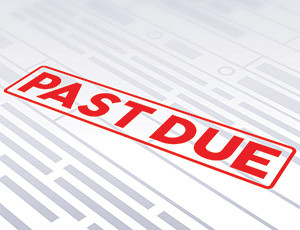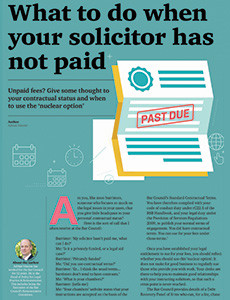*/

Mark Friston’s refresher on contractual arrangements between counsel and their instructing solicitors, with a particular emphasis on actually getting paid
How things have changed. Within living memory, Denning MR had this to say about counsel’s expectation of getting paid: ‘His very robe bears witness. At the back of it there is still the flap of the little pocket where the client could place his gratuity [in] the pretence that the barrister did not know he was being given a reward!’ So, it was ungentlemanly of a barrister to seek payment (all barristers being men, obviously), and the idea of an enforceable right to payment would have caused our lofty barrister’s wig to fall off.
Fortunately, common sense prevailed; in 1991, statute intervened to permit enforceable contracts between solicitors and counsel. But nothing changed for an entire generation. It was only in 2013 that contractual arrangements between counsel and their instructing solicitors became the norm.
One may have thought that the starting place would be the contract of retainer. In many cases, this would be so, but where the reality is that counsel is going to be paid out of the recoveries, it is generally better to stand back and ask how that pie is going to be shared.
Where there is to be a notion of the division of the spoils, by far the best thing to do is to deal with this explicitly in the contract of retainer (or, in a case that has the benefit of litigation funding, in the priorities waterfall). Retainers that take account of recoveries are commonplace; they range from CFA Lites (where counsel eats what they kill) all the way through to Harrington agreements (where constraints are placed on the way in which payment is enforced). Harrington agreements can be tailored to suit almost any commercial need, and as such are becoming an increasingly popular choice.
The main point, however, is that before any contract of retainer is made, thought must be given to whether it is a division-of-the-spoils case.
At the risk of stating the obvious, in a privately funded case there must be a written, enforceable contract of retainer. It is surprisingly common how often this key requirement is overlooked. It should be noted that the Standard Contractual Terms for the Supply of Legal Services by Barristers to Authorised Persons 2020 do not apply by default (although the Licensed Access Terms of Work are more forgiving in this regard).
The present state of the law is that the court may be willing to find that there is an implied retainer (and may even afford restitutionary remedies to counsel), but such claims are fraught with difficulties and ought to be avoided. Moreover, if the retainer is in any way conditional upon the outcome of the claim, it will be a conditional fee agreement (and therefore must be in writing).
The Combar and City of London Law Society Contractual Terms deserve a particular mention. This is because they contain an option (known as ‘Basis B’) which means that counsel will be paid only when the solicitors are put in funds. Those terms provide that ‘the Solicitor will endeavour to collect from the Lay Client the Barrister’s fees properly due in the same manner as the Solicitor endeavours to collect the Solicitor’s own fees’, but it is anything but clear what this Delphic term means. It should be noted that if counsel relies on the right be assigned the right to payment, they will be inheriting any problems that there might be with the solicitors’ retainer; this may lead to litigation under Part III of the Solicitors Act 1974 (which is best avoided).
The topic of contracts of retainer in general is beyond the scope of this article, but the following points are worth mentioning:
In contrast to other members of the liberal professions (who have such matters etched into the DNA), the Bar does not tend to have much regard to credit control. Indeed, credit control tends to be limited to the following:
This is a very short list. It is, for example, very rare for counsel to ask for any form of security or guarantee. The reason for this is (in the writer’s view) because there is a culture at the Bar that promotes the idea what that rigorous credit control will in some way deter valuable clients from instructing counsel. This, however, is faulty commercial reasoning, as the purpose of credit control is not just to ensure that counsel is paid, but to ensure that clients do not overstretch themselves or abuse credit. If a client objects to such an approach (assuming it to be reasonable), then this, of itself, should start alarm bells ringing.
The following points may be made about record keeping; particularly relevant where counsel’s fees are to be recovered from an opponent:
The most obvious means of enforcing payment of fees is to bring a claim for payment of the fees as a debt; if judgment is entered, then it may be enforced in the usual way.
Fortunately, help is available. The Bar Council publishes a list of approved solicitors known as the Debt Recovery Panel. In recognition of the fact that many solicitors will pay upon receipt of a letter of claim, some members of that panel offer to write such letters for a (very) modest fixed fee. Others offer their fees on a conditional fee agreement basis. This can even include recovery of debts from clients in other jurisdictions.
There are other means of bringing pressure to bear. In an egregious case, it may still be possible to make a complaint to the Solicitors Regulation Authority. Furthermore, the Bar Council continues to publish the List of Defaulting Solicitors (which is now known as the Advisory List of Defaulting Solicitors). The effect of a firm being on this list extends beyond reputational damage as counsel is permitted to decline instructions from any firm who is on that list (see rC30.7b of the BSB Handbook). That said, it should be noted that very few defaulting solicitors have been added to that list in recent years; this is because (in contrast to the position as it was prior to 2013), the Bar Council adds solicitors to that list only if there is a judgment against them, and even where there is a judgment, few barristers bother to inform the Bar Council. It is, however, always worth being aware of which firms are on the list.



How things have changed. Within living memory, Denning MR had this to say about counsel’s expectation of getting paid: ‘His very robe bears witness. At the back of it there is still the flap of the little pocket where the client could place his gratuity [in] the pretence that the barrister did not know he was being given a reward!’ So, it was ungentlemanly of a barrister to seek payment (all barristers being men, obviously), and the idea of an enforceable right to payment would have caused our lofty barrister’s wig to fall off.
Fortunately, common sense prevailed; in 1991, statute intervened to permit enforceable contracts between solicitors and counsel. But nothing changed for an entire generation. It was only in 2013 that contractual arrangements between counsel and their instructing solicitors became the norm.
One may have thought that the starting place would be the contract of retainer. In many cases, this would be so, but where the reality is that counsel is going to be paid out of the recoveries, it is generally better to stand back and ask how that pie is going to be shared.
Where there is to be a notion of the division of the spoils, by far the best thing to do is to deal with this explicitly in the contract of retainer (or, in a case that has the benefit of litigation funding, in the priorities waterfall). Retainers that take account of recoveries are commonplace; they range from CFA Lites (where counsel eats what they kill) all the way through to Harrington agreements (where constraints are placed on the way in which payment is enforced). Harrington agreements can be tailored to suit almost any commercial need, and as such are becoming an increasingly popular choice.
The main point, however, is that before any contract of retainer is made, thought must be given to whether it is a division-of-the-spoils case.
At the risk of stating the obvious, in a privately funded case there must be a written, enforceable contract of retainer. It is surprisingly common how often this key requirement is overlooked. It should be noted that the Standard Contractual Terms for the Supply of Legal Services by Barristers to Authorised Persons 2020 do not apply by default (although the Licensed Access Terms of Work are more forgiving in this regard).
The present state of the law is that the court may be willing to find that there is an implied retainer (and may even afford restitutionary remedies to counsel), but such claims are fraught with difficulties and ought to be avoided. Moreover, if the retainer is in any way conditional upon the outcome of the claim, it will be a conditional fee agreement (and therefore must be in writing).
The Combar and City of London Law Society Contractual Terms deserve a particular mention. This is because they contain an option (known as ‘Basis B’) which means that counsel will be paid only when the solicitors are put in funds. Those terms provide that ‘the Solicitor will endeavour to collect from the Lay Client the Barrister’s fees properly due in the same manner as the Solicitor endeavours to collect the Solicitor’s own fees’, but it is anything but clear what this Delphic term means. It should be noted that if counsel relies on the right be assigned the right to payment, they will be inheriting any problems that there might be with the solicitors’ retainer; this may lead to litigation under Part III of the Solicitors Act 1974 (which is best avoided).
The topic of contracts of retainer in general is beyond the scope of this article, but the following points are worth mentioning:
In contrast to other members of the liberal professions (who have such matters etched into the DNA), the Bar does not tend to have much regard to credit control. Indeed, credit control tends to be limited to the following:
This is a very short list. It is, for example, very rare for counsel to ask for any form of security or guarantee. The reason for this is (in the writer’s view) because there is a culture at the Bar that promotes the idea what that rigorous credit control will in some way deter valuable clients from instructing counsel. This, however, is faulty commercial reasoning, as the purpose of credit control is not just to ensure that counsel is paid, but to ensure that clients do not overstretch themselves or abuse credit. If a client objects to such an approach (assuming it to be reasonable), then this, of itself, should start alarm bells ringing.
The following points may be made about record keeping; particularly relevant where counsel’s fees are to be recovered from an opponent:
The most obvious means of enforcing payment of fees is to bring a claim for payment of the fees as a debt; if judgment is entered, then it may be enforced in the usual way.
Fortunately, help is available. The Bar Council publishes a list of approved solicitors known as the Debt Recovery Panel. In recognition of the fact that many solicitors will pay upon receipt of a letter of claim, some members of that panel offer to write such letters for a (very) modest fixed fee. Others offer their fees on a conditional fee agreement basis. This can even include recovery of debts from clients in other jurisdictions.
There are other means of bringing pressure to bear. In an egregious case, it may still be possible to make a complaint to the Solicitors Regulation Authority. Furthermore, the Bar Council continues to publish the List of Defaulting Solicitors (which is now known as the Advisory List of Defaulting Solicitors). The effect of a firm being on this list extends beyond reputational damage as counsel is permitted to decline instructions from any firm who is on that list (see rC30.7b of the BSB Handbook). That said, it should be noted that very few defaulting solicitors have been added to that list in recent years; this is because (in contrast to the position as it was prior to 2013), the Bar Council adds solicitors to that list only if there is a judgment against them, and even where there is a judgment, few barristers bother to inform the Bar Council. It is, however, always worth being aware of which firms are on the list.


Mark Friston’s refresher on contractual arrangements between counsel and their instructing solicitors, with a particular emphasis on actually getting paid


The Bar Council is ready to support a turn to the efficiencies that will make a difference
By Louise Crush of Westgate Wealth Management
Marie Law, Director of Toxicology at AlphaBiolabs, examines the latest ONS data on drug misuse and its implications for toxicology testing in family law cases
An interview with Rob Wagg, CEO of New Park Court Chambers
What meaningful steps can you take in 2026 to advance your legal career? asks Thomas Cowan of St Pauls Chambers
Marie Law, Director of Toxicology at AlphaBiolabs, explains why drugs may appear in test results, despite the donor denying use of them
The appointments of 96 new King’s Counsel (also known as silk) are announced today
Ready for the new way to do tax returns? David Southern KC continues his series explaining the impact on barristers. In part 2, a worked example shows the specific practicalities of adapting to the new system
Resolution of the criminal justice crisis does not lie in reheating old ideas that have been roundly rejected before, say Ed Vickers KC, Faras Baloch and Katie Bacon
With pupillage application season under way, Laura Wright reflects on her route to ‘tech barrister’ and offers advice for those aiming at a career at the Bar
Jury-less trial proposals threaten fairness, legitimacy and democracy without ending the backlog, writes Professor Cheryl Thomas KC (Hon), the UK’s leading expert on juries, judges and courts